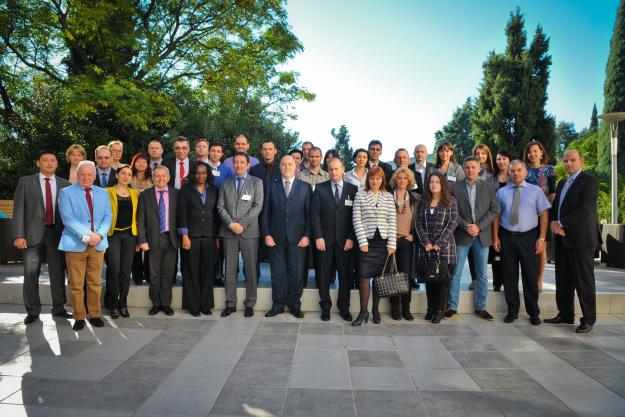
Participants at the regional training course on technical aspects of the CWC transfers regime held in Montenegro
The OPCW and National Authority of Montenegro jointly organised a training course for customs officers of States Parties in Eastern Europe on the technical aspects of the transfers’ regime of the Chemical Weapons Convention (CWC) from 28 to 31 October 2014 in Podgorica. The course was attended by 36 participants from 17 States Parties.*
The agenda included overviews of the CWC and the OPCW; the role of National Authorities; the need for effective stakeholder engagement with customs authorities; transfer-related provisions of the CWC; and identification of chemicals relevant to the Convention, including recommendations of the World Customs Organization to identify Scheduled chemicals in the Harmonised System.
The course familiarized participants with OPCW tools for identifying Scheduled chemicals such as the Handbook on Chemicals, Online Scheduled Chemicals database, OPCW Central Analytical Database, brochure on Most Traded Scheduled Chemicals, and other information resources. The course also included practical exercises regarding import and export of Scheduled chemicals and the identification of Scheduled chemicals using the OPCW tools.
Participants learned practical ways to implement the CWC’s provisions and to eliminate discrepancies between quantities of Scheduled chemicals declared by importing and exporting States Parties in respect of the same transfers. They discussed practical customs-related matters such as the control of Scheduled chemicals in ports and free zones, risk assessment, trans-shipments, and software for customs services.
Participants delivered presentations on four key areas: identification of Scheduled chemicals, control of transit and transhipments, Custom’s role in resolving transfer discrepancy, and engagement of National Authorities. They also shared their experience in national implementation of CWC transfer provisions and national legislation on controlling the trade in chemicals including those chemicals scheduled in CWC.
* Azerbaijan, Belarus, Bulgaria, Croatia, Estonia, Georgia, Hungary, Kyrgyzstan, Latvia, Lithuania, Macedonia, Moldova, Montenegro, Poland, Romania, Serbia and Ukraine.
